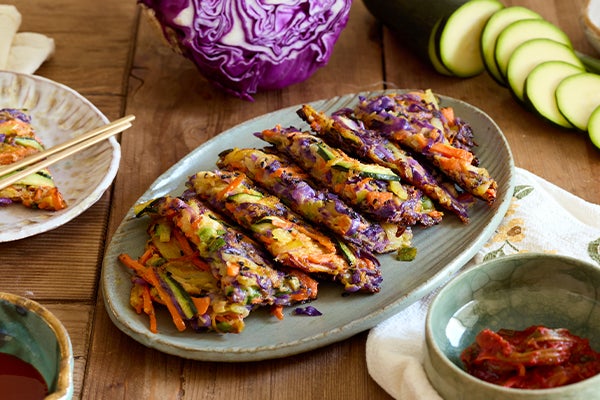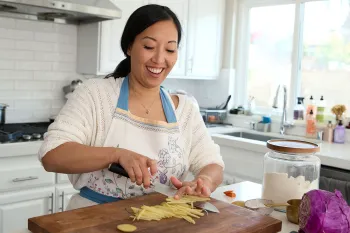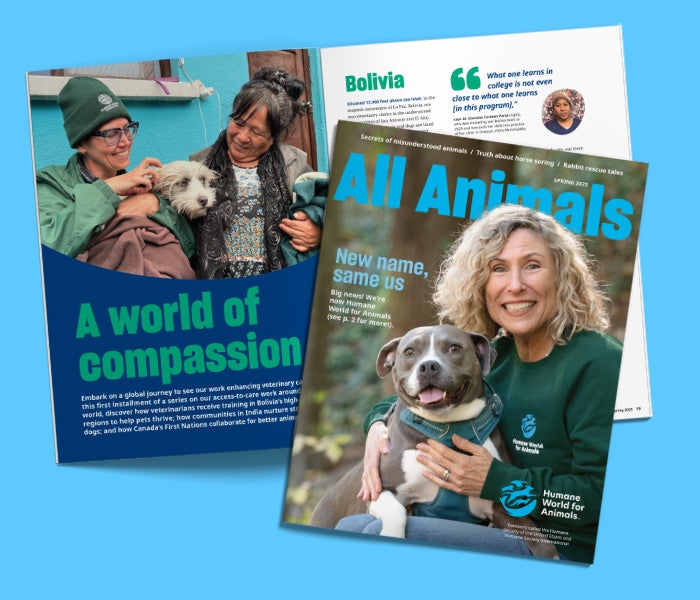In her best-selling book, The Korean Vegan Cookbook: Reflections and Recipes from Omma’s Kitchen, Joanne Lee Molinaro writes, “I was terrified that going vegan meant losing my Koreanness.”
In 2016, the Chicago lawyer was a year into a relationship when her boyfriend decided to eat a plant-based diet for health reasons. Molinaro admits that she was insecure and thought that the relationship wouldn’t survive unless she also changed her diet. Around the same time, her father was diagnosed with prostate cancer. Taking it as a divine sign of the importance of good nutrition, she decided to stop eating meat, and then, all animal products.
She was nervous about the transition. Molinaro says she had “a very common misconception about veganism—that it was a primarily white [person’s] diet: kale salad and quinoa and smoothie bowls.” She decided to expand beyond that, finding ways to veganize her favorite Korean dishes. For instance, she realized that she could prepare kimchi without fish sauce and use eggplant instead of beef in galbijjim (braised short ribs). She also decided to document this process of discovery on a blog.
Much has changed since then. Molinaro now works full-time on The Korean Vegan (thekoreanvegan.com) and is married to the partner who adopted a plant-based diet alongside her. They now live in Los Angeles. Her cookbook has won a James Beard Award. And she’s a keen marathon runner, who enjoys dispelling myths around nutrition and endurance sports.
Her family has gradually come around as well. After initially believing that her new way of eating was just a fad, her parents are now very supportive and have reduced their own consumption of animal products. There’s still some work to do in terms of her family’s understanding, Molinaro says with a laugh. After developing shin splints, a common runner’s ailment, following her fourth marathon, her aunt assumed that it was somehow related to her vegan diet.
Unexpectedly, plant-based cooking has offered a deeper path to understanding her heritage as the daughter of parents who immigrated from what is now North Korea. “Because I was trying to veganize Korean food, I was learning what Korean food was,” Molinaro reflects. She learned about scarcity mentality tied to wartime experiences and about the long-standing plant-based tradition of Buddhist temple cuisine. Far from divorcing her from her cultural identity, “All of these things made me more Korean,” she says.
Molinaro prizes frankness. On social media, she shares freely with her millions of followers on topics ranging from cellulite to menopause. And she’s open about the insecurities that continue to beset her despite her success.
This honesty extends to how she—the keynote speaker at our 2024 Taking Action for Animals conference—talks about animal welfare. For most of her life, Molinaro says, “I loved animals, but I was happily living in cognitive dissonance.” Now she tries to be gentle with others in exploring ways to reduce harm to animals with their food choices; for instance, she encourages trying plant-based meats and cheeses if these are readily available.
This overall attitude has been influenced by a mantra that she heard from a Buddhist nun in South Korea: “Just do the least amount of harm.” It’s both simple and subjective, Molinaro explains. One person’s version of reducing harm will look different from another’s.
For instance, she understands all too well that for many Asian Americans who grew up being mocked for their non-mainstream food, it can be hard to hear that their food choices are problematic for other reasons. “It’s a very different conversation for different people, but it requires honesty,” she says.
For Molinaro, “it’s just so nice to know that my eating is now aligned with my values.”
Christine Ro is a freelance journalist in London. She has published on cage-free movements around the world and animal-methods bias in scientific research.

Molinaro’s version of jeon, a savory pancake or fritter, doesn’t require a dipping sauce—the dish is infused with garlic powder, onion powder and soy sauce, making each bite, in her words, a “massive umami bomb.“
Rainbow jeon
Korean cuisine includes many types of jeon, eaten as appetizers, often on special occasions. Molinaro loves this version’s rainbow of veggies which can be swapped out for others, such as white cabbage in place of red cabbage.
Total time 20 minutes | Serves 4
1 jalapeño, seeded and sliced
1 russet potato, julienned
1 large carrot, julienned
4 red cabbage leaves, julienned
4 green onions, chopped
½
cup JUST Egg plant-based liquid eggs
(or nondairy milk)
¼ cup flour (can substitute gluten-free flour)
2 Tbsp potato starch
¼ tsp salt
¼ tsp black pepper
1 Tbsp onion powder
1 Tbsp garlic powder
2 Tbsp soy sauce
1 Tbsp oil, for frying
1 Tbsp black sesame seeds, halved
-
Place all chopped vegetables in a large bowl.
-
Add liquid egg replacer (or nondairy milk) to the bowl along with flour, potato starch, salt, pepper, onion powder, garlic powder and soy sauce; mix everything together.
- In a medium nonstick pan, add oil over medium high heat. When oil begins to shimmer, pour entire contents of the bowl into the pan.
- Cook for about 3 minutes, until underside is golden brown; flip using a large spatula. Sprinkle top with sesame seeds. Cook for an additional 2 minutes; flip once more. Cook for 1 minute.
-
Remove from the pan and cut into rectangular pieces.
Per serving 142 cal, 2 g fat, 4 g pro, 27 g carb, 2 g sugar, 676 mg sodium

